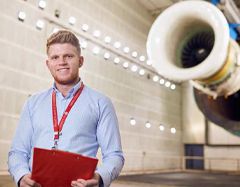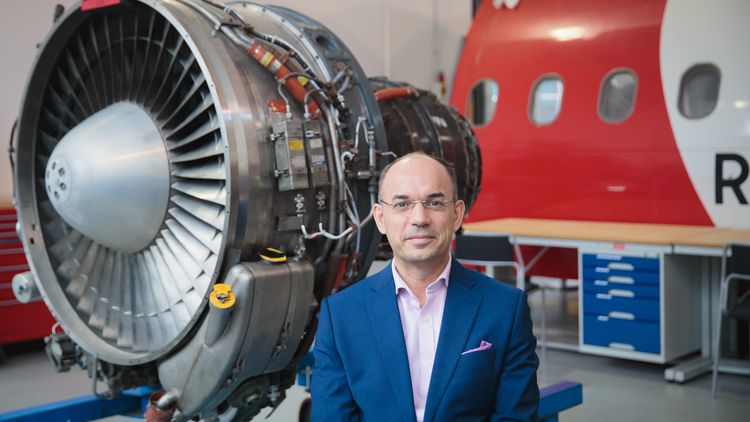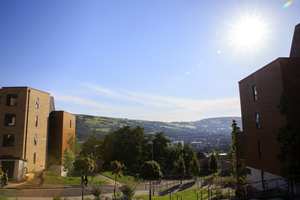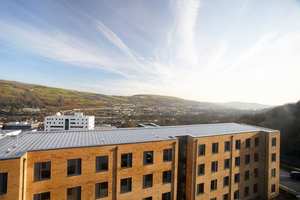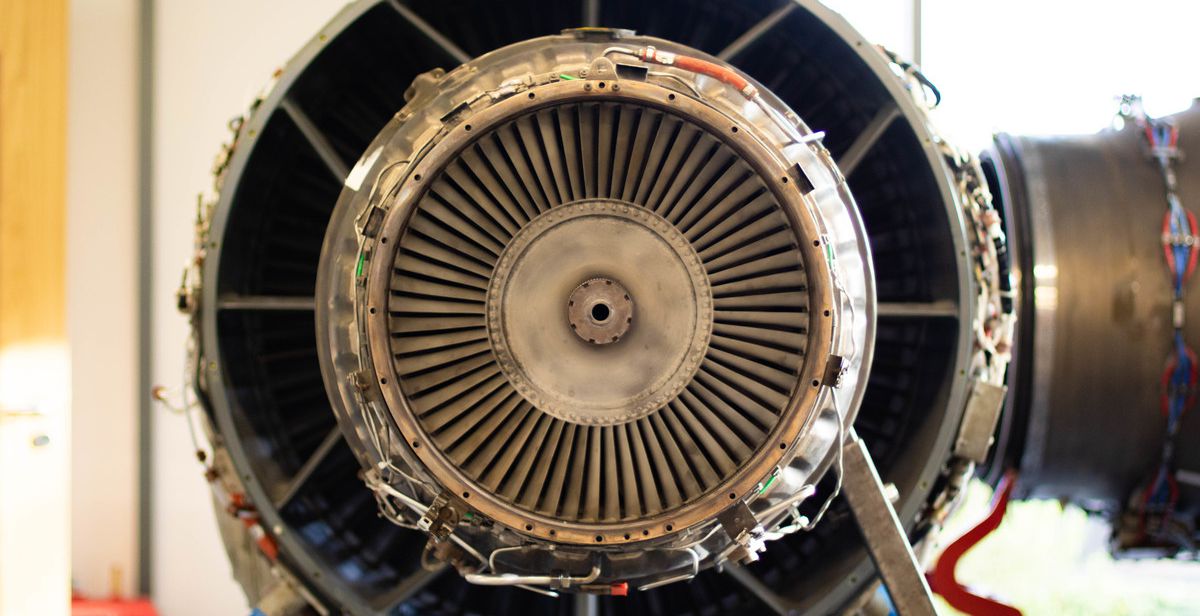
BEng (Hons) Aerospace Engineering (Including Foundation Year)
Aeronautical and Aerospace Engineering students rated USW top ten in the UK for assessment, academic support, organisation, learning resources and student voice National Student Survey 2023
This degree aims at providing you with the knowledge and skills required in the Aerospace Industry.
Flight vehicles are subjected to demanding conditions such as those caused by changes in atmospheric pressure and temperature, with structural loads applied upon vehicle components. Consequently, they are usually the products of various technological and engineering disciplines including aerodynamics, propulsion, avionics, materials science, structural analysis and manufacturing. Because of the complexity and number of disciplines involved, aerospace engineering is carried out by teams of engineers, each having their own specialised area of expertise.
The course is designed to meet accreditation requirements of the RAeS and IMechE for Incorporated Engineer status. This course will include a live flight experience, which is reinforced with SIM work in Flight Simulator. We have strong links with industry and place considerable emphasis on student projects. We also encourage industrial placements as part of a sandwich year option.
This degree includes a large amount of mathematical and computational analysis, mixed with practical design and build activities, which are designed to embed the classroom learning. The first year of the course is common with our aeronautical provision allowing you the chance to switch between courses at the end of your first year. Commencing the second year you will study a range of aerospace modules unique to this course, and this thread then continues until the end of your studies.
The course is designed with industry in mind, and opportunities that will arise in the aerospace industry. USW has a strong record of placing graduate engineers in substantive roles upon graduation.
You will develop soft skills through practical design and make activities, and finally, you will study elements of management, business and project management. This will develop your initiative, and effective communication and interpersonal skills, to achieve the high level of technical leadership required in a modern engineering environment. Your new skills will be further tested through group and individual research and design projects.
The course is delivered on a full time basis, and the typical academic year runs from the end of September to Easter, with Exams in May. Typically modules have between two and three hours of contact time per week, with directed learning and independent study making up the majority of a students study requirements.
We offer a range of guest lectures, Engineering trips and industrial visits during the course.
Foundation Year: Aerospace Engineering degree
The Foundation Year will give you a good understanding of our engineering courses and provide you with a good numerical background to support you throughout the remainder of the degree. Following your initial foundation year, you will progress onto the modules studied as part of your award.
- Foundations of Mathematics - 20 credits
- Further Foundation Maths for Engineers - 20 credits
- Essential Engineering Skills - 20 credits
- Engineering Project - 20 credits
- Foundation Engineering Principles - 20 credits
- English for Engineering (optional) - 20 credits
- Fundamentals of Mechanical Engineering (optional) - 20 credits
Year One: Aerospace Engineering degree
Year one of this engineering programme provides essential scientific principles and practices associated with aeronautical engineering. This includes an introduction to using design tools and general manufacturing/workshop techniques. You will also learn how to use industry-standard CAD packages and programming language.
- Mathematics for Mechanical and Aeronautical Engineers - 20 credits
- Design and Manufacture - 20 credits
- Engineering Computing Applications - 20 credits
- Engineering Mechanics 1 - 20 credits
- Electrical Science - 20 credits
- Thermofluids 1 - 20 credits
Year Two: Aerospace Engineering degree
Year two of this engineering programme contains modules unique to the aerospace engineering course. Within this year of the course you'll explore key areas within aerospace engineering alongside rocket and space technology and aerospace design that are unique to the aerospace engineering course.
- Control and Instrumentation - 20 credits
- Thermofluids 2 - 20 credits
- Engineering Materials - 20 credits
- Further Engineering Mathematics - 20 credits
- Rocket and Space Technology - 20 credits
- Aerospace Design - 20 credits
Year Three: Aerospace Engineering degree
This year builds upon the previous years within the aerospace engineering course and offers further modules that are unique to this course including aerospace propulsion, that considers flight at speeds greater than Mach 1, and aerospace structures and materials that considers the unique challenges that arise when dealing with structures that are designed for use outside of the atmosphere and are subject to forces that arise from typical launch velocities.
- Engineering Computational Analysis - 20 credits
- Aircraft Flight Dynamics - 20 credits
- Individual Project - 20 credits
- Aerospace Propulsion - 20 credits
- Aerospace Structures and Materials - 20 credits
- Project Management and the Engineering Society - 20 credits
- Supervised Work Experience (Optional) -120 credits
Teaching
You can study this degree on a full time basis and it also offers a sandwich work placement should you decide this is an appropriate pathway for you.
This aerospace programme is taught through lectures, which are supported by tutorials, practical sessions and seminar groups. Wherever possible, your work will be based on live projects and case studies, with contributions from industry professionals.
Throughout your course, you will engage in activities that help you become self-reliant, self-motivated and resourceful, as well as develop leadership qualities and management expertise.
Assessment
There is a range of assessment methods, such as formal closed book exams, group work, individual projects, oral assessments and laboratory experiments, exams contribute approximately 30% of all assessments on the course.
The programme of assessment aims to measure the skill and competence of the individual student by means of a structured and integrated approach to a defined coursework schedule.
The assessment strategy has been devised to reflect the diverse nature of the module content with a balance between those modules assessed through assignments, coursework and oral presentations.
Placements
Facilities
Our facilities include:
- Well-equipped computer rooms using industry standard design and analysis software for Finite Element Analysis and Computation Fluid Dynamics, including SolidWorks, MatLab Ansys & LS-Dyna.
- Fully equipped engineering workshop, which include 3D printers, water and laser cutters, four axis CNC, a range of general purpose engineering machines for the production of samples for projects
- We also have composite manufacturing facilities, additive manufacturing facilities, laser scanner, wind tunnel, material testing facilities, non-destructive facilities as well as laboratories with equipment for supplementing teaching in mechanics, dynamics, materials, thermodynamics, fluid-dynamics and control.
- We currently have a well-equipped Formula Student build area, and a rocketry society.
Lecturers
The Course Leader is Dr Darren Williams
The teaching team includes:
- Dr Shee Meng Thai
- Dr Joao Ramos
- Dr Vishagen Ramasamy
- Dr Colin Morgan
- Dr Selim Tudgey
- Dr Mohamed Mohamed
- Dr CK Tan CEng
- Mr David Dawkins CEng
- Mr Ewen Constant CEng
- Mr Ilias Lappas CEng FRAeS
- Mr Matthew Jones CEng
- Dr Meinwen Taylor CEng
- Dr Olusanjo Fadiya CEng
All staff profiles and research interests are available via PURE
Support
We have an open door policy, all students are assigned a Personal Academic Coach, and we also run a student to student study skills support system for help with tutorial questions and topics within the department.
We regularly revalidate courses for quality assurance and enhancement
At USW, we regularly review our courses in response to changing patterns of employment and skills demand to ensure we offer learning designed to reflect today’s student needs and tomorrow’s employer demands.
If during a review process course content is significantly changed, we’ll write to inform you and talk you through the changes for the coming year. But whatever the outcome, we aim to equip our students with the skillset and the mindset to succeed whatever tomorrow may bring. Your future, future-proofed.
Contextual offers
We may make you a lower offer based on a range of factors, including your background (where you live and the school or college that you attended for example), your experiences and individual circumstances (as a care leaver, for example). This is referred to as a contextual offer and we receive data from UCAS to support us in making these decisions. USW prides itself on its student experience and we support our students to achieve their goals and become a successful graduate. This approach helps us to support students who have the potential to succeed and who may have faced barriers that make it more difficult to access university. Here is a link to our Contextual Admissions Policy.
Other qualifications and experience
We can also consider combinations of qualifications and other qualifications not listed here may also be acceptable. We can sometimes consider credits achieved at other universities and your work/life experience through an assessment of prior learning. This may be for year one entry, or advanced entry to year two or three of a course where this is possible.
To find out which qualifications have tariff points, please refer to the UCAS tariff calculator.
If you need more help or information or would like to speak to our friendly admissions team, please contact us here
Typical A-Level Offer
DD, 48 tariff points
Typical BTEC Offer
BTEC Extended Diploma Pass Pass Pass or BTEC Diploma Pass Pass
Typical Access to HE Offer
Pass Access to HE Diploma with a minimum of 48 UCAS Tariff points
Additional Requirements
GCSEs: The University normally requires a minimum 3 GCSEs including Mathematics/Numeracy and English at Grade C or Grade 4 or above, or their equivalent, but consideration is given to individual circumstances.
International Entry Requirements
We also welcome international applications with equivalent qualifications. Please visit the country specific pages on our international website for exact details.
If your current qualifications don't meet the entry requirements for entry onto year 1 of your chosen undergraduate degree, we offer one-year International Foundation Programmes through our pathway partnership with QAHE to help you reach the level required for progression. For more information visit our Pathway website.
English Requirements
In general, international applicants will need to have achieved an overall IELTS grade of 6.0 with a minimum score of 5.5 in each component.
However, if you have previously studied through the medium of English IELTS might not be required, but please visit the country specific page on our international website for exact details. If your country is not featured please contact us.
Full-time fees are per year. Part-time fees are per 20 credits. Once enrolled, the fee will remain at the same rate throughout the duration of your study on this course.
August 2024 - July 2025 Fees
Full-time UK: £9000
Full-time International: £15260
August 2025 - July 2026 Fees
Full-time UK: TBC
Full-time International: TBC
Student Perks
At the University of South Wales, you’re investing in so much more than a degree. We strive to provide our students with the best possible experience, no matter what you chose to study. Whether it’s access to top of the range mac books and PCs, state-of-the-art facilities packed with industry-leading equipment and software, masterclasses and events led by industry experts, or a wide range of clubs and societies to meet likeminded people, better tomorrows start with extra perks.
Each course also has their own unique student benefits to prepare you for the real word, and details of these can be found on our course pages. From global field trips, integrated work experience and free course-related resources, to funded initiatives, projects working with real employers, and opportunities for extra qualifications and accreditations - at USW your future, is future-proofed.
Click here to learn more about student perks at USW.
Additional Costs
As a student of USW, you’ll have access to lots of free resources to support your study and learning, such as textbooks, publications, online journals, laptops, and plenty of remote-access resources. Whilst in most cases these resources are more than sufficient in supporting you with completing your course, additional costs, both obligatory and optional, may be required or requested for the likes of travel, memberships, experience days, stationery, printing, or equipment.
Funding
Funding to help pay for (or cover) course tuition fees and living costs
Whilst you’re studying, you’ll have two main financial obligations – tuition fees and living costs. There’s lots of financial help available from the University of South Wales and external funding sources, that may provide loans (which have to be paid back) and grants, scholarships and bursaries (that don't).
To learn about course fees, funding options, and to see if you are eligible for financial support, visit our Fees and Funding pages.
UK students
Apply via UCAS if you are a UK residing applicant, applying for year one of a full-time undergraduate degree, Foundation Year, Foundation Degree or HND and you have not applied through UCAS before. If you are applying to study part-time, to top up your Foundation Degree or HND, or to transfer to USW from another institution, please apply directly.
International and EU students
Apply directly to the University if you live outside the UK.
The aerospace industry is worth around $300 billion and is expected to approximately double by 2025. In 2021 116,000 people were employed in the industry in the UK.
The industry is changing rapidly and moving towards environmentally friendly fuels which will completely dominate the market in the next few decades. This course was designed with these technological developments in mind so that graduates are equipped for the aerospace industry of the future.
For students interested in a sandwich year, we have a dedicated placement officer within the School of Engineering, this is additional to the universities provision.
Possible career options
Any organisation under the broad umbrella of aerospace engineering, to include design, development, test, manufacture of aerospace systems and components. Including aeronautical engineering applications such as aeroplane components and systems.
Alternative complimentary engineering organisations, such a seat manufacture, automotive engineering, mechanical and manufacturing industries. Defence systems and military organisations.
What kind of student would this course suit?
This course would appeal to Student interested in a career in the aerospace / aeronautical Industry.
Once the foundations have been laid, you will study cutting edge technology in the field of aeronautics and aerospace engineering.
You will learn to think rationally and creatively, we will teach you to communicate effectively, both orally and in writing, for technical and lay audiences.

